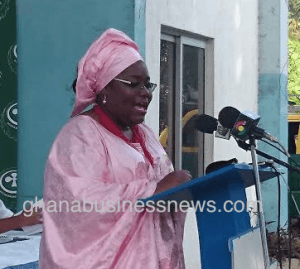World Bank funded GH¢1.3m LEAP Management Secretariat inaugurated

The Livelihood Empowerment Against Poverty (LEAP) Management Secretariat Office Block has been inaugurated to accommodate the 56 officers on the programme.
The GH₵1.3 million World Bank-funded-edifice has an open office to seat about 50 staff, two other offices, kitchenette, archival office, and two wash rooms on the ground floor.
The top floor also has a 30-seater conference room, an office each for the Coordinator, Deputy Coordinator and the IT Manager, a server room, and an ante-room for preliminary discussions before conference.
Nana Oye Lithur, the Minister of Gender, Children and Social Protection, inaugurating, said LEAP was launched in 2008 as Ghana’s flagship programme for the National Social Protection Strategy.
She said the LEAP was mandated to target 2.2 million extremely poor Ghanaians, who on the basis of two months, would have to be given financial support.
She said the programme had so far taken care of one million beneficiaries from 213,000 households and it would be increased by an additional 50,000 households in due course.
The Minister said over the past four years, LEAP had delivered beneficial support for the poor and had worked together to ensure that the less privileged had a stipend to improve their livelihoods.
She commended the her Deputy, Mrs Dela Sowah, the Chief Director, the staff of the secretariat and the World Bank for their support and encouragement.
Nana Oye Lithur said it was her hope that anybody who would work in the secretariat would do nothing else than good work for the people of Ghana.
Mr Dzigbordi Agbegbornu, the National Manager, LEAP, said the new office block would enhance productivity because it would address some of the challenges hindering the efficient execution of the programme.
Hitherto, most of the staff were in different locations and this made it difficult for them to work.
He announced that the Secretariat had migrated from a manual payment system to bio-metric and it had also shifted to electronic data collection, which had made the exercise very robust, leading to more than 9000 beneficiaries being registered in 2016.
He said the next frontier was linkages for complementary services and children in the School Feeding programme.
Source: GNA
